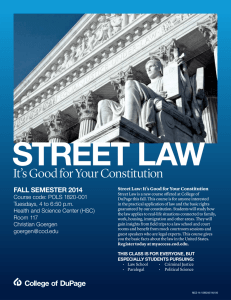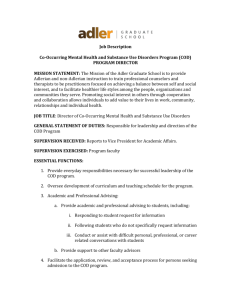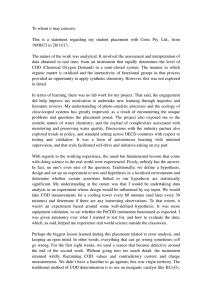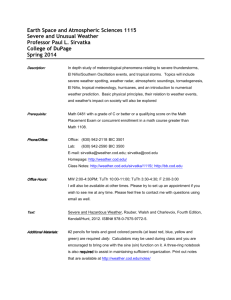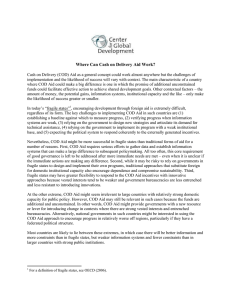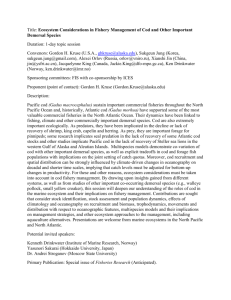LEARNING COMMUNITIES Spring 2016
advertisement
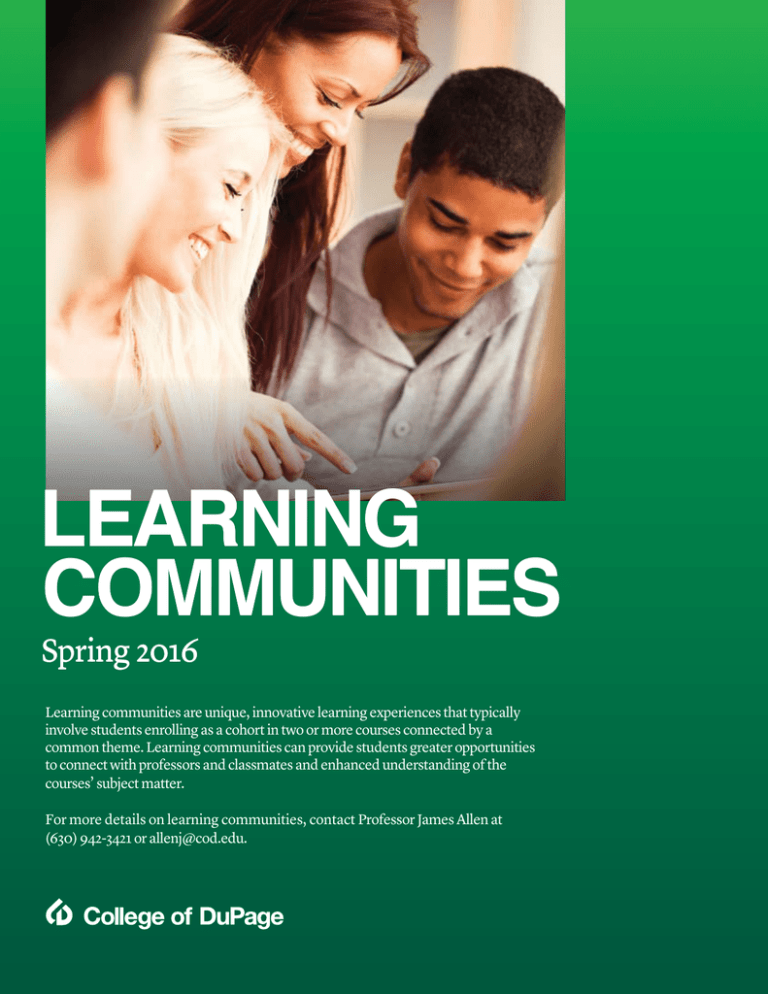
LEARNING COMMUNITIES Spring 2016 Learning communities are unique, innovative learning experiences that typically involve students enrolling as a cohort in two or more courses connected by a common theme. Learning communities can provide students greater opportunities to connect with professors and classmates and enhanced understanding of the courses’ subject matter. For more details on learning communities, contact Professor James Allen at (630) 942-3421 or allenj@cod.edu. Planetary Ethics For Honors students only. Living in a global environment will require imaginative, creative and reflective abilities to deal with the environmental challenges on this crowded planet. This Honors Seminar combines environmental biology with environmental ethics to explore human relationships with the environment. Investigate how nature works, how things are interconnected and how theories and principles of ethics are applied to major areas of environmental concern. Connect conceptual discussions with practical experiences during field trips as well as in COD’s own community farm. The biology course counts as a lab science and both courses are general education core courses. To participate in this learning community, you must con-enroll in BIOLO-1110-HON01 and PHILO-1116-HON01. A $25 fee includes transportation costs. Tuition is extra. For more information, contact Eva Maria Raepple at (630) 942-3983, raepple@cod.edu or Shamili Ajgaonkar at (630) 942-2123, sandifor@cod.edu. BIOLO-1110-HON01, Environmental Biology Tuesday/Thursday, 12:30 to 1:50 p.m. LEARNING COMMUNITIES Body Language Becoming a health care professional involves learning a dizzying array of terms and phrases unique to the field. Intended for health care majors, this learning community focuses on mastering the language of medicine while exploring the mechanics of the human body. Through a variety of integrated assignments, you will learn and apply medical terminology through the context of studying the most fundamental subject of health care: the human anatomy. To participate in this learning community, you must co-enroll in ANAT-1500-FS030 and HLTHS 1110-FS030. For more information, contact Nancy Feulner at (630) 942-2124, feulner@cod.edu or John Myers at myersj146@cod.edu. ANAT-1500-FS030, Survey of Human A & P Monday/Friday, 9 to 9:50 a.m. and Wednesday, 11:20 a.m. to 1:20 p.m. PHILO-1116-HON01, Environmental Ethics Tuesday/Thursday, 11 a.m. to 12:15 p.m. People and the Planet: Making Connections Between Life and Chemistry Explore the complex connections between living organisms and their environment. Learn about the physical science within the life science. Topics will include sustainability, global climate change, energy sources and food and agriculture. During this exclusive learning community, you will learn essentials necessary to be a scientifically literate global citizen. Additional hours TBA. To participate in this learning community, you must co-enroll in BIOLO-1110-FS034 and CHEMI-1105-FS034. A $25 fee includes transportation costs. Tuition is extra. For more information, contact Shamili Ajgaonkar at (630) 942-2123, sandifor@cod.edu or Mary Newberg at (630) 942-4066, newberg@cod.edu. CHEMI-1105-FS034, Contemporary Chemistry Monday/Tuesday, 1 to 4 p.m. HLTHS-1110-FS030, Biomedical Terminology Wednesdays, 9 to 10:50 a.m. BIOLO-1110-FS034, Environmental Biology Wednesday, Noon to 4 p.m. Decision 2016: Rhetoric, Research, and Reality The Tribe has Spoken: Groups and Social Change Confused by all the conflicting messages from political candidates? Not sure what’s true versus what’s hype and spin? Frustrated that many important issues aren’t being addressed? Then join this learning community, focusing on the upcoming elections in the fall for President, Senate, House, and various local races. We’ll examine the elements that shape and inform such campaigns while applying information literacy skills to explore key issues, fact-check candidates and the media, and advocate for policies and positions relevant to the elections ahead. To participate in this learning community, you must co-enroll in ENGLI-1102-FS030 and POLS-1101-FS030. For more information, contact James Allen at (630) 942-3421, allenj@cod.edu or Chris Goergen at (630) 942-2012, goergen@cod.edu. Throughout American history, groups have been a force for social change. This course will combine Humanities 1110, Arts and Cultural Diversity, and Speech 1120, Small Group Communication to examine the powerful ways in which groups have functioned to address issues that impact human relations such as race, ethnicity, gender and power. Experience working in teams while studying leadership, group process, and interpersonal relations while exploring the foundations of American cultural diversity rooted in the influences of African, Native American, Asian and Latin American civilizations. For more information on this learning community, contact Lauren Morgan at (630) 942-2007, morgan@cod.edu or Josh Price at (630) 942-2695, pricej@cod.edu. ENGLI-1102-FS030, English Composition II Monday/Wednesday, Noon to 1:15 p.m. POLS-1101-FS030, American Politics Monday/Wednesday, 1:30 to 2:45 p.m. HUMNT-1110-LC030, Arts and Cultural Diversity TBA SPEEC-1120-LC030, Small Group Communication TBA FLDSTUD-15-20541(12/15) Spring 2016
